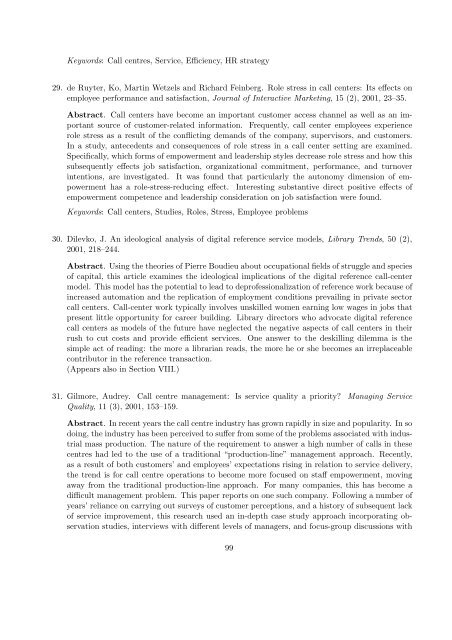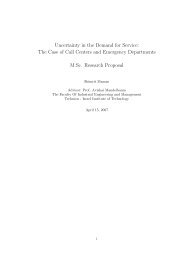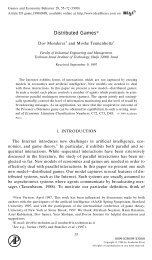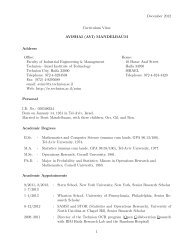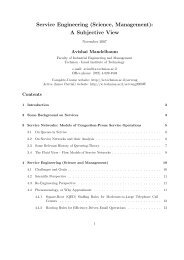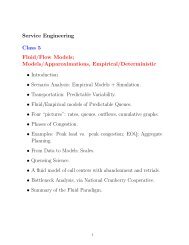CALL CENTERS (CENTRES) - Faculty of Industrial Engineering and ...
CALL CENTERS (CENTRES) - Faculty of Industrial Engineering and ...
CALL CENTERS (CENTRES) - Faculty of Industrial Engineering and ...
You also want an ePaper? Increase the reach of your titles
YUMPU automatically turns print PDFs into web optimized ePapers that Google loves.
Keywords: Call centres, Service, Efficiency, HR strategy<br />
29. de Ruyter, Ko, Martin Wetzels <strong>and</strong> Richard Feinberg. Role stress in call centers: Its effects on<br />
employee performance <strong>and</strong> satisfaction, Journal <strong>of</strong> Interactive Marketing, 15 (2), 2001, 23–35.<br />
Abstract. Call centers have become an important customer access channel as well as an important<br />
source <strong>of</strong> customer-related information. Frequently, call center employees experience<br />
role stress as a result <strong>of</strong> the conflicting dem<strong>and</strong>s <strong>of</strong> the company, supervisors, <strong>and</strong> customers.<br />
In a study, antecedents <strong>and</strong> consequences <strong>of</strong> role stress in a call center setting are examined.<br />
Specifically, which forms <strong>of</strong> empowerment <strong>and</strong> leadership styles decrease role stress <strong>and</strong> how this<br />
subsequently effects job satisfaction, organizational commitment, performance, <strong>and</strong> turnover<br />
intentions, are investigated. It was found that particularly the autonomy dimension <strong>of</strong> empowerment<br />
has a role-stress-reducing effect. Interesting substantive direct positive effects <strong>of</strong><br />
empowerment competence <strong>and</strong> leadership consideration on job satisfaction were found.<br />
Keywords: Call centers, Studies, Roles, Stress, Employee problems<br />
30. Dilevko, J. An ideological analysis <strong>of</strong> digital reference service models, Library Trends, 50 (2),<br />
2001, 218–244.<br />
Abstract. Using the theories <strong>of</strong> Pierre Boudieu about occupational fields <strong>of</strong> struggle <strong>and</strong> species<br />
<strong>of</strong> capital, this article examines the ideological implications <strong>of</strong> the digital reference call-center<br />
model. This model has the potential to lead to depr<strong>of</strong>essionalization <strong>of</strong> reference work because <strong>of</strong><br />
increased automation <strong>and</strong> the replication <strong>of</strong> employment conditions prevailing in private sector<br />
call centers. Call-center work typically involves unskilled women earning low wages in jobs that<br />
present little opportunity for career building. Library directors who advocate digital reference<br />
call centers as models <strong>of</strong> the future have neglected the negative aspects <strong>of</strong> call centers in their<br />
rush to cut costs <strong>and</strong> provide efficient services. One answer to the deskilling dilemma is the<br />
simple act <strong>of</strong> reading: the more a librarian reads, the more he or she becomes an irreplaceable<br />
contributor in the reference transaction.<br />
(Appears also in Section VIII.)<br />
31. Gilmore, Audrey. Call centre management: Is service quality a priority? Managing Service<br />
Quality, 11 (3), 2001, 153–159.<br />
Abstract. In recent years the call centre industry has grown rapidly in size <strong>and</strong> popularity. In so<br />
doing, the industry has been perceived to suffer from some <strong>of</strong> the problems associated with industrial<br />
mass production. The nature <strong>of</strong> the requirement to answer a high number <strong>of</strong> calls in these<br />
centres had led to the use <strong>of</strong> a traditional “production-line” management approach. Recently,<br />
as a result <strong>of</strong> both customers’ <strong>and</strong> employees’ expectations rising in relation to service delivery,<br />
the trend is for call centre operations to become more focused on staff empowerment, moving<br />
away from the traditional production-line approach. For many companies, this has become a<br />
difficult management problem. This paper reports on one such company. Following a number <strong>of</strong><br />
years’ reliance on carrying out surveys <strong>of</strong> customer perceptions, <strong>and</strong> a history <strong>of</strong> subsequent lack<br />
<strong>of</strong> service improvement, this research used an in-depth case study approach incorporating observation<br />
studies, interviews with different levels <strong>of</strong> managers, <strong>and</strong> focus-group discussions with<br />
99


